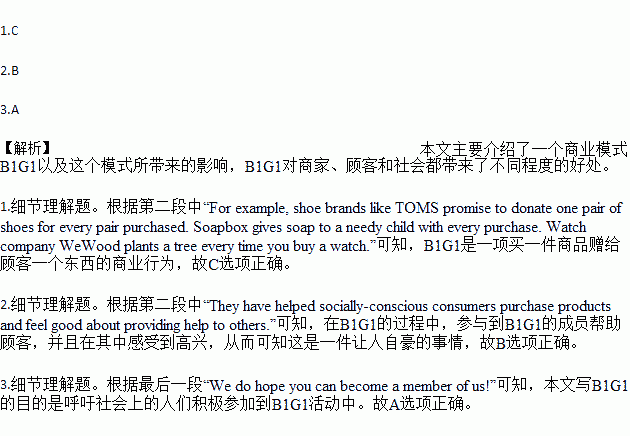题目内容
Buy One Give One
Buy One Give One (B1G1) is a Singapore-based business and non-profit organization with a job to create a world full of giving. We help businesses around the world give back in meaningful ways so that they can create measurable and long-lasting influence. Since 2007, we have worked with more than 1,600 businesses creating more than 88 million giving activities.
Our business allows consumers, who may feel disconnected from the problems of the developing world, to become involved in social problems while still purchasing for themselves. For example, shoe brands like TOMS promise to donate one pair of shoes for every pair purchased. Soapbox gives soap to a needy child with every purchase. Watch company WeWood plants a tree every time you buy a watch. They have helped socially-conscious consumers purchase products and feel good about providing help to others.
See what some of our members say about being a part of B1G1.
*Karen Ormerod
Every product purchased at our store influences the lives of disadvantaged people in the world. I had never imagined I would be operating a business that could change people’s lives. We are making a real difference by just doing what we normally do. It is a wonderful experience.
*Ben Baker
What a good way of distributing resources to where they need to be, giving people the gifts of giving, and adding value to organizations along the way. We have already made 160,000 giving activities through B1G1. Giving has become a necessary part of our everyday business. It’s absolutely brilliant.
B1G1 focuses on the influence of giving on people’s lives rather than simply the amounts donated. Our programs stress giving habitually in order to create growing influence around the world. When you join the B1G1 giving program, you create your own unique giving stories.
We do hope you can become a member of us!
1.According to the passage, what does B1G1 do?
A. Donate the profits to the people in need.
B. Help consumers purchase their favorite products.
C. Give away something extra when a product is sold.
D. Instruct owners how to operate businesses effectively.
2.How do the members feel about themselves as a part of B1G1?
A. Confident.
B. Proud.
C. Generous.
D. Energetic.
3.What is the purpose of the passage?
A. To invite businesses to B1G1.
B. To promote the products B1G1 sells.
C. To describe the gifts B1G1 gives.
D. To introduce the activities B1G1 involves.
 各地期末复习特训卷系列答案
各地期末复习特训卷系列答案 小博士期末闯关100分系列答案
小博士期末闯关100分系列答案Should doctors ever lie to benefit their patients to speed recovery or to cover the coming of death? In medicine as in law, government, and other lines of work, the requirements of honesty often seem dwarfed by greater needs; the need to protect patients from brutal news, to uphold a promise of secrecy or to advance the public interest.
What should doctors say, for example, to a 46-year-old man coming in for a routine physical checkup just before going on vacation with his family who, though he feels in perfect health, is found to have a form of cancer that will cause him to die within six months? Is it best to tell him the truth? If he asks, should doctors reject that he is ill, or minimize the gravity of the illness? Should they at least hide the truth until after the family vacation?
Doctors face such choices often. At times, they see important reasons to lie for the patients’ own sake; in their eyes, such lies differ sharply from self-serving ones.
Studies show that most doctors sincerely believe that the seriously ill patients do not want to know the truth about their condition, and that informing them of risks destroys their hope, so that they may recover more slowly, or deteriorate faster, perhaps even commit suicide.
But other studies show that, contrary to the belief of many physicians, a great majority of patients do want to be told the truth, even about serious illness, and feel cheated when they learn that they have been misled. We are also learning that truthful information, humanely conveyed, helps patients cope with illness; help them tolerate pain better with less medicine, and even recover faster after surgery.
There is an urgent need to debate this issue openly. Not only in medicine, but in other professions as well, practitioners may find themselves repeatedly in difficulty where serious consequences seem avoidable only through deception. Yet the public has every reason to know the professional deception, for such practices are peculiarly likely to become deeply rooted, to spread, and to trust. Neither in medicine, nor in law, government, or the social sciences can there be comfort in the old saying, “What you don’t know can’t hurt you.”
Title: 1. Or Not
Different 2. | ·Most doctors are in 3. of lying for the patients’ own sake. |
·A great majority of patients 4. on being told the truth. | |
Reasons for 5. lying to patients | ·Informing patients of the truth about their condition destroys their hope, 6. to recovering more slowly, or deteriorating faster, perhaps even 7. themselves. |
Reasons 8. lying to patients | ·The truthful information helps patients to 9. their illness, help them tolerate pain better with less medicine, and even recover faster after surgery. ·Most patients feel 10. when they learn that they have been misled. |

